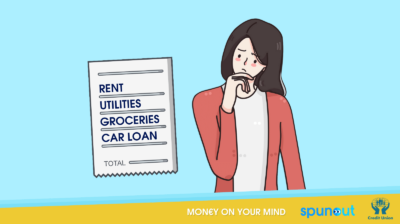How to get control over your spending
If you are finding it difficult to manage your spending, try some of these simple tips

If you’re finding it hard to get your spending habits under control, there are some strategies you can try.
When you can shop with the swipe of a card or click of a button, it can be easy to purchase things that you really don’t need. Wasting money is a challenge that many of us face. If you find that you usually have no money left at the end of the month but you’re not really sure how, it could be a good idea to take a look at your spending habits. With some simple strategies, you will be able to better manage your money.
Strategies to avoid wasting money
By being mindful about your spending and introducing some new habits, you can avoid wasting money on things you don’t need.
Set up physical barriers to avoid unnecessary spending
Making it difficult to shop for non-essentials might help you to reduce your unnecessary spending. There are certain physical barriers that you can put in place to make it harder to waste your money. Actions you can take include:
- Putting your savings into an advance notice account can make it difficult to make any rash spending decisions. These bank accounts require you to give a minimum amount of notice (e.g. 10 days) before you can withdraw any money
- By avoiding online shopping, you can reduce the amount of unnecessary purchases that you make and save money on associated shipping costs
- Leave any debit or credit cards behind and only bring the cash you need with you when you go out
- Make sure any item that you buy has a full return policy in case you decide you do not want or need it
- Order groceries online for collection/ delivery to avoid making impulse buys
- If browsing in shops is a hobby of yours, try out some alternative activities. Walking, borrowing books from the library and visiting free museums are just some of the new activities that you can adopt
If you are restricting your access to your money with advance notice accounts or by leaving your money at home, it is important to keep your needs in mind. You need to make sure that you can access the money that you need for food, transport, college materials, healthcare, and unexpected expenses or emergencies. Creating a personal budget can help you to determine the amount of money you can safely lock away into a savings account. Find out more about how to create a budget.
Consider a budgeting app
If you are making a budget, there are many free budgeting apps available that can help you such as YNAB (You Need a Budget), Splitwise, and Spendee. These apps can help you plan and track expenses, or split bills, for example if you share a home with others.
Try to avoid the temptation to shop
While the ability to place orders from your phone is very convenient, it can also lead to impulse buys. By deleting shopping and food delivery apps from your phone and unfollowing clothing brands on social media, you can help reduce the temptation to buy things you don’t really need.
Avoiding sales can help to reduce the temptation also. Sales are designed to entice people to spend, even if they don’t have the money or the need for what they buy. It can be tempting to buy things just because they are being sold at a reduced price. However, if you are buying something for yourself that you don’t really need, it is still usually a waste of money. This is true regardless of how little you paid for it. Regular small purchases add up and can make a big difference to your bank balance.
You don’t have to avoid sales altogether. However, if you want to avoid wasting money, it is important to plan ahead before visiting them. Make a list of things that you actually need before going to a sale and try your best to stick to it. If you find that difficult to do, it might be best to avoid sales for a while.
Make a weekly meal plan
It can be easy to buy more than you need to in the supermarket, particularly when you are faced with so many food options and weekly promotions. However, buying food on impulse can lead you to waste money. It can also lead to food waste as, if you buy more than you need, food might go off before you have an opportunity to use it. Unless you are buying non-perishable items that you use regularly and may be cheaper to buy in bulk (e.g. rice), it is best to avoid buying more than you need for the week.
Avoid wasting money or food by making a weekly meal plan before going grocery shopping. Decide what meals you will eat over the course of seven days and figure out what ingredients you will need to prepare them. Choosing meals that have some overlap in terms of ingredients can help you to get the most out of what you buy. For example, if you need to purchase some tomatoes for a curry and the packet contains more than the recipe calls for, you could decide to use the remaining tomatoes in a soup or omelette for lunch. Remember to choose meals that you enjoy eating as this will make it much easier to stick to your plan.
Before finalising your meal plan and grocery list, check your cupboards. This way, you can finish what you already have before getting a replacement.
Making a meal plan will also help you to keep dining out to a minimum. It is much cheaper to prepare meals at home than eat in restaurants or cafes.
Sleep on it
If you want to learn how to manage your spending, it doesn’t mean you can never buy yourself a meal out or new outfit again. It is good to treat yourself to things that you enjoy from time to time. However, it is important to be mindful of why, when and how you do it.
Sometimes we purchase things because we are bored or think we might use them. If you see something that you like in a shop or online, it is often a good idea to wait before buying it. By giving yourself time, you might decide that you don’t really want or need the item. Alternatively, you might come to the conclusion that you do need it, but find it at a cheaper price in the meantime. Comparing the cost of an item in different shops or seeking out a secondhand version might allow you to save some money.
Whatever the purchase is, take the time to consider your own needs and options. Gaining that sense of perspective can help you to avoid wasting money on things you don’t need and truly value the things you do buy.
Try to avoid choosing convenience over cost
Many of us are living very busy lives. When you are short on time, it can be tempting to choose the convenient option. Unfortunately, the convenient options are usually the more expensive options. For example, buying a takeaway is much more costly than cooking at home. If you find yourself choosing takeaways often, consider setting aside some time once a week to batch cook and freeze meals instead. This will allow you to have quick and nutritious meals at a much lower cost.
Sometimes, opting for convenience might be your best or only option. That is completely ok, so try not to feel guilty when you make that decision. However, try to consider your reasons for making a purchase before doing so. Only you can determine what is best for you.
Need more information, advice or guidance?
We offer information, advice and guidance about the issues that matter to you. Our online Youth Information Chat service is for 16 to 25 year olds and is available Monday to Friday, 4pm to 8pm (excluding Bank Holidays).






